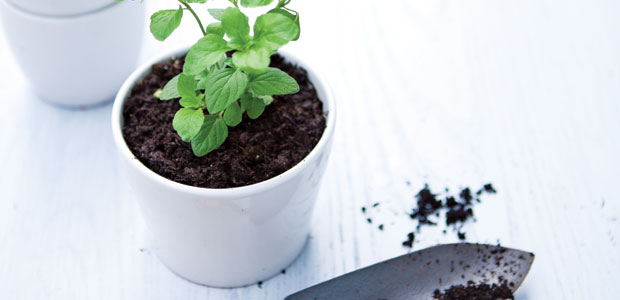Advertisement
Grow, Cook, Heal
Cooking with everyday garden herbs for whole health

With their varying shades of green and fragrant aromas, common garden herbs share a rich and flavourful history in the kitchen as well as in the pharmacy. Our continuing interest in natural health means the link to using medicinal herbs in the kitchen becomes stronger.
Look to the garden and your dinner plate to treat minor daily discomforts and increase overall health. Everyday kitchen herbs such as parsley, rosemary, mint and thyme can bring physical relief while increasing nutrition and heightening the flavour and enjoyment of a good meal. They’re easy to grow in your own backyard or balcony, and require little maintenance.
Basil
Basil is rich in flavonoids (especially orientin and vicenin), which keep cells healthy and functioning properly. As a good source of bone-building vitamin K, basil also helps promote blood clotting to heal cuts and abrasions. Pepper your food with fresh basil to soothe menstrual pains and ease sore muscles; basil contains eugenol, an antiinflammatory compound that acts as nature’s own aspirin.
Mint
Use mint as a digestive and antinausea aid. The menthol activates digestive enzymes, which relax the intestine for smooth digestion. The rosmarinic acid in mint shows promise in aiding respiratory disorders and promoting good oral health. Some studies suggest that peppermint oil contains a phytonutrient that may inhibit the growth of mammary, liver and pancreatic tumours.
Parsley
Rich in myristicin, parsley contains chemoprotective qualities which may inhibit growth of certain tumours and neutralise carcinogens in grilled food. It is also rich in disease-fi ghting vitamins C and A, which fortify our immune system to help battle colds. It has been used traditionally to help cleanse blood and tissues in the kidney, liver and bladder.
Rosemary
Soothing in its aroma, rosemary also stimulates the immune system and keeps the blood flowing to ensure a healthy nervous system. Fragrant sprigs contain anti-inflammatory properties useful in quelling asthma attacks and bringing relief to headaches.
Sage
Sage contains rosmarinic acid, a powerful antioxidant that stimulates the nervous system and protects against cell damage. Its anti-inflammatory properties may help soothe asthma and rheumatoid arthritis pain. Sage also contains phytosterols that may help alleviate cramps and provide relief for menopausal hot flashes.
Oregano
Antifungal and antiviral properties are found in oregano oil as well as a high amount of fibre, which, when digested, helps break down unhealthy cholesterol. It’s also rich in vitamin C and calcium to help keep bones healthy. In traditional Chinese medicine, oregano is often used to help bring down a fever, treat jaundice and relieve diarrhoea.
Dill
Similar to parsley, dill contains chemoprotective compounds and antioxidants that zap celldamaging free radicals. Dill is often used as a digestive aid (relieves wind) and is a good source of fibre and magnesium, a nerve and muscle relaxant.
Thyme
Known for its help with respiratory problems, thyme is used to soothe coughs, chest congestion and bronchitis. As an antiseptic and digestive aid, it soothes sore throats and coughs. Thyme is also a good source of omega-3 fatty acids, linked to keeping the brain, kidney and heart healthy.
Recipes
- Salsa Verde
- Dark Chocolate and Rosemary Pudding
- Greek-style Chicken Skewers
- Thyme, Tomato and Corn Pancakes
Did you know?
Fresh herbs have more aromatic and delicate flavour than dried ones. When cooking with fresh herbs, don’t be shy! Dried herbs tend to have a more pungent and less floral aroma than fresh, and since their flavour is concentrated, you won’t need to use as much.




